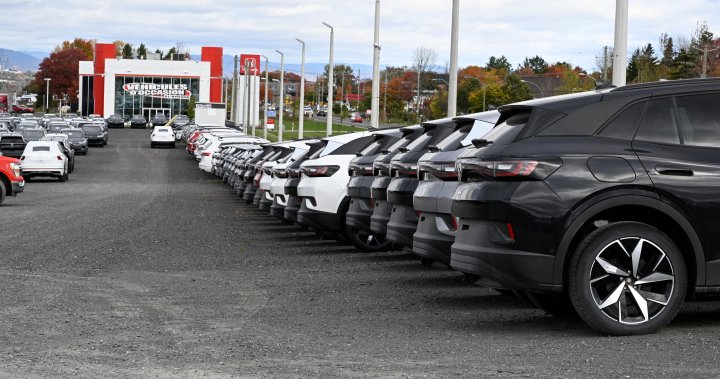Owning a vehicle in Canada is rapidly getting more expensive — in some cases, at a faster rate than inflation — and could rise 25 per cent with tariffs and inflation, a new survey suggests.
The Leger survey for Turo Canada, a car-sharing company, says the average cost to own a car or truck has gone up nine per cent since last year, and experts say that will go up even more given the economic outlook.
Economists and financial analysts say U.S. President Donald Trump imposing tariffs on virtually all countries and sparking a trade war will ultimately result in higher prices for consumers, including cars and trucks.
Although Prime Minister Mark Carney’s new government has pledged to work to blunt as much of the tariff pain as possible, including for the auto sector, it will be some time before prices reflect any improvements, the survey suggests.
Until then, Canadians should expect car ownership to become even more of a financial burden as the cost rises even more rapidly.
According to the survey results, the average Canadian spends $5,497 to own a vehicle annually, with Ontario the highest at close to $6,000 and British Columbia the most affordable near $4,500. Plus, one out of three respondents say their expenses exceed $7,000 per year.
Get weekly money news
Get expert insights, Q&A on markets, housing, inflation, and personal finance information delivered to you every Saturday.
Those who own vehicles reported that of their monthly net income, an average 14 per cent goes towards car-related expenses. Younger drivers are paying significantly more, with those aged 25 to 44 paying an average $7,029 per year, while those over 65 pay roughly half that at $3,728.
Household size and income also play a role as those with higher incomes and/or children typically own more than one vehicle.
And it isn’t just about paying for the car itself through financing or leasing,
“One of the biggest costs is your fuel. Another thing is maintenance. Everyone has to replace tires at one point, the brakes, oil changes — we don’t necessarily put that all in the bucket of what it’s cost to own our vehicle,” says Kristine D’Arbelles at the Canadian Automobile Association.
“You also have your insurance costs and that number varies significantly.”
Then, if you want to eventually sell or trade in your vehicle, D’Arbelles notes the importance of factoring in a vehicle’s depreciation over time.
“Depreciation is if you are expecting to sell your car … knowing that you’re not going to be able to sell it for the same amount that you bought it,” she says.
“It can be up to 50 per cent of the cost of owning and operating your vehicle.”
Those who already own a vehicle are also expected to face some rising costs in the face of Trump’s tariffs.
The overwhelming majority of Canadians still rely on using a vehicle, with more than half of survey respondents saying that without access to one they would need to change jobs.
Alternatives certainly exist, such as public transit, taxis and ride-hailing services, as well as walking or biking where possible.
However, not everyone has these options available, especially those who live in more remote or suburban areas or where public transportation isn’t satisfactory.
Forty-one per cent of respondents said they wish there were better transportation options so they wouldn’t need a car at all.
© 2025 Global News, a division of Corus Entertainment Inc.

